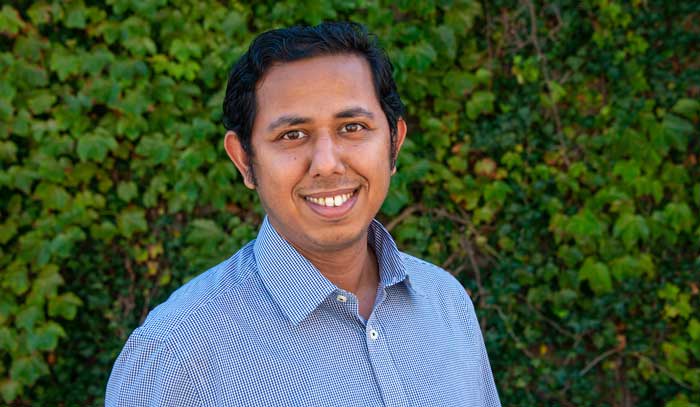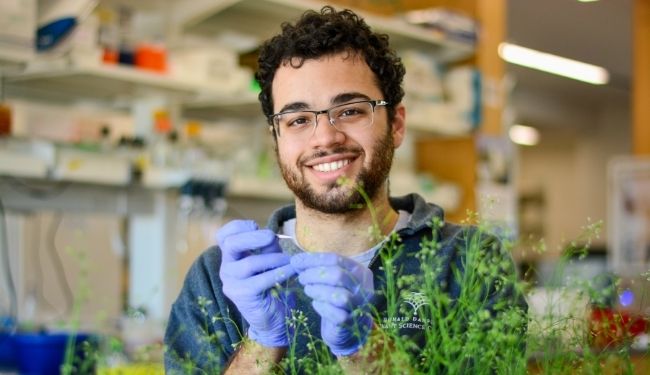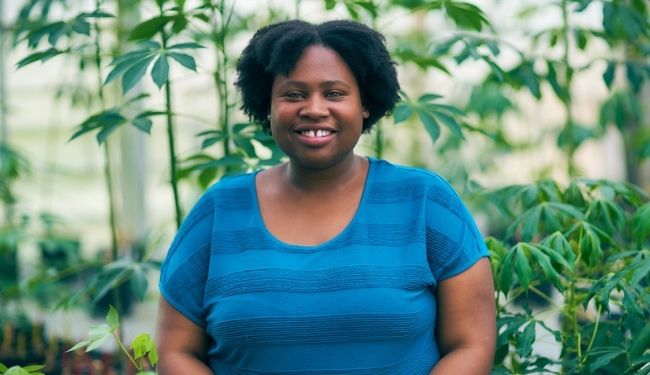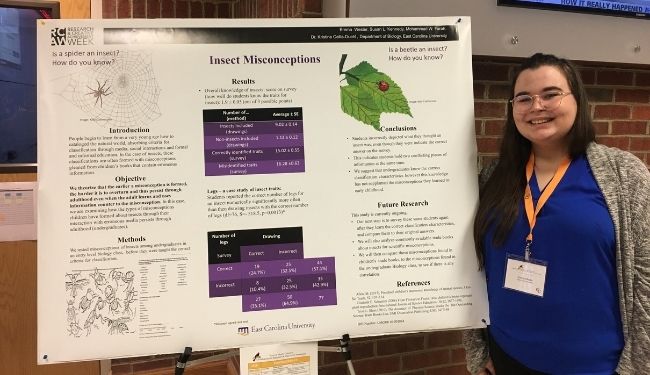Celebrating Danforth Center Graduate Students for Graduate Student Appreciation Week
This week we are celebrating our graduate students for Graduate Student Appreciation Week! Graduate students contribute important research across nearly all labs at the Danforth Center.
At the Danforth Center, graduate students have the opportunity to participate in cutting-edge thesis research, gain interdisciplinary skills, and learn how we turn plant science discoveries into real-world solutions. Most of our Principal Investigators have joint or adjunct appointments at one or more partner universities, enabling students to do laboratory rotations and dissertation research at the Center while enrolled in one of several graduate degree programs.
Keep reading to meet a few of many talented graduate students at the Danforth Center: Mohammad Fazle Azim, Seth Edwards, Kiona Elliott, and Emma Wester.

Mohammad Fazle Azim is a Graduate Student in Dr. Tessa Burch-Smith’s Lab
Mohammad Fazle Azim, Graduate Student in the Burch-Smith Lab
As an undergraduate student, Mohammad was selected to complete an undergraduate thesis in his school’s plant tissue culture lab. During his thesis he experimented with different concentrations of plant growth hormones to regenerate the whole plant from small stem explants. “This remarkable capacity for regeneration fascinated me, and I wanted to learn more about plants,” says Mohammad. Today, he is a University of Tennessee - Knoxville graduate student researching intercellular communication in plants in Dr. Tessa Burch-Smith’s Lab.
Mohammad moved to St. Louis with the Burch-Smith Lab in 2021. “I still remember the Zoom meeting with Dr. Burch-Smith when she asked me if I wanted to move to the Danforth Center to do the rest of my PhD research there,” he says. “I replied in a nanosecond with ‘Yes!’ After one year at Danforth Center, I can tell that I love my journey of learning and growth to be a plant scientist.” Mohammad says he has benefitted from working alongside renowned plant scientists at the Danforth Center and acquiring the skills for using state-of-the-art instruments.
In the future, Mohammad hopes to pursue a career in research. “My plan after graduation is to get postdoc training in a renowned lab so that I can build a career as a research scientist,” says Mohammad.

Seth Edwards is a University of Missouri - Columbia graduate student in Dr. Keith Slotkin’s lab.
Seth Edwards, Graduate Student in the Sloktin Lab
Seth Edwards’ first experience with the Danforth Center was as a Research Experience for Undergraduates (REU) intern. “It was a wonderful experience learning on a short time-scale what graduate school was like,” says Seth. Today, he is a University of Missouri - Columbia graduate student in Dr. Keith Slotkin’s lab.
Seth was inspired to pursue a graduate degree after gaining lab experience as an undergraduate. “The process of discovery became very exciting to me,” he explains. “Learning to ask new questions and make incremental findings was something that drove me throughout undergrad.” At the Danforth Center, Seth has grown from being surrounded by experts. The relationships he has built has enabled him to learn and develop hard skills, as well as gain access to great advice on how to navigate graduate school.
While Seth is interested in pursuing a career in academia, he could also see himself working in industry. “I am most interested in basic science and following interesting research leads. With that being said, I am also tantalized by the collaborative environment that industry has to offer,” says Seth. “As I have experienced academia since becoming a graduate student, I also wish to have industrial experience before deciding fully on a career path.”

Kiona Elliott, Washington University - St. Louis graduate student in Dr. Rebecca Bart’s lab
Kiona Elliott, Graduate Student in the Bart Lab
Kiona Elliott is a Washington University - St. Louis graduate student in Dr. Rebecca Bart’s lab. Kiona has been at the Danforth Center for over four years. During that time, she has made an impact on the Danforth Center community through her research and her leadership as a 2020 CSTM Co-Chair. “My time at the Danforth Center has allowed me to become a stronger scientist,” says Kiona. “Having access to the resources and experts here has been beneficial to my training and progression of my thesis work.”
Kiona was inspired to pursue graduate school after learning about the power of plant biotechnology as an undergraduate student. “I thought the potential of using genetic engineering to answer fundamental plant biology questions and improve vital crops was incredible and I wanted to be involved in the process,” she says.
After she graduates, Kiona hopes to join a research team focused on using biotechnology to make crops durable and sustainable to environmental stressors. “Ultimately, I aim to connect scientifically improved crops with farmers and communities that need them the most,” says Kiona.

Emma Wester, St. Louis University Graduate Student in Dr. Kris Callis-Duehl’s Lab
Emma Wester, Graduate Student in the Callis-Duehl Lab
Emma Wester first met Dr. Kris Callis-Duehl at East Carolina University, where she worked as a teaching and research assistant in her lab. At the time, Emma was a pre-med student who ran a global health organization on campus and spent her breaks going to developing countries to work in clinics. During her time working with the health organization, she saw that the communities she was working with faced large education gaps. “We could provide all the humanitarian relief we could but it didn't mean as much without education,” explains Emma. “This got me interested in education research and Kris invited me to work as a graduate student in her lab. When she came to the Danforth Center, she brought me with her.”
Today, Emma is a Saint Louis University graduate student in Dr. Kris Callis-Duehl’s lab at the Danforth Center. “The Danforth Center has provided me with a ton of resources throughout graduate school,” she says. One example she points to is being able to rapidly gain Institutional Review Board approval to explore students’ experiences during the pandemic. “This allowed me to collect data that will be a large part of my dissertation and has already yielded multiple publications,” explains Emma.
Ultimately, Emma's main goal is to help others. “Ideally, I'd like to combine my background in STEM education research and public health into a career to help improve the lives of others,” says Emma.